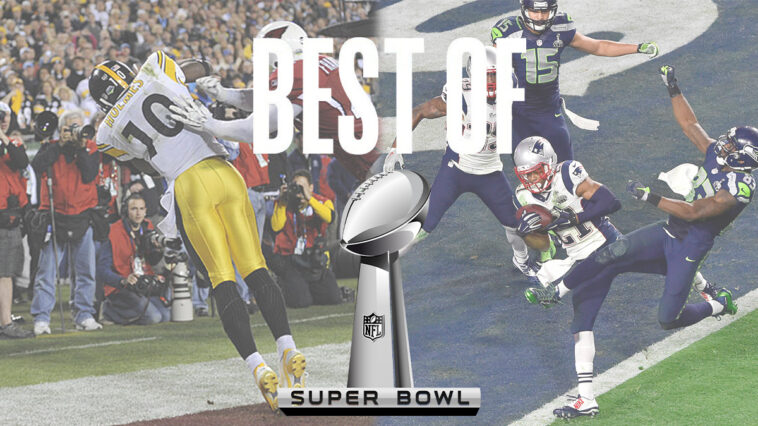Narratives play a huge role in driving public interest in the Super Bowl every year. With two weeks between conference title games and Super Bowl Sunday, NFL scribes and fans have plenty of time to think of certain storylines to follow once the big game arrives.
Super Bowl 55 between the Kansas City Chiefs and Tampa Bay Buccaneers certainly isn’t lacking in that regard. On one hand, we have Patrick Mahomes and the Chiefs trying to win the Super Bowl for the second consecutive year. That feat hasn’t been accomplished since Tom Brady and the Patriots won back-to-back Super Bowls in 2004 and 2005. The fact that Brady is the man standing between Mahomes and history is the icing on the cake.
We have Brady looking to win the Super Bowl for a record seventh time. The Buccaneers will be looking to remain on the short list of teams to have won multiple Super Bowls without a loss in the game. We also have Antonio Brown and Le’Veon Bell going head-to-head in a battle between a couple of Steelers castaways set to square off for the first time as opponents.
Super Bowl 55 has the potential to be one of the most compelling games we’ve ever seen. However, whether it actually lives up to the billing remains to be seen. The Super Bowl has produced countless unforgettable games in the past. What are the five best Super Bowls ever played?
5. Pittsburgh Steelers 35, Dallas Cowboys 31 (Super Bowl 13)
Super Bowl 13 was a memorable matchup between a pair of the NFL’s flagship franchises. The Pittsburgh Steelers entered the game with a record of 14-2 as the top seed in the AFC playoffs. The 12-4 Dallas Cowboys finished the season as the No. 2 seed in the NFC. The teams were led by a pair of legendary coaches in Chuck Noll (Steelers) and Tom Landry (Cowboys), and the game itself wound up living up to the hype.
The Cowboys had beaten the Broncos in Super Bowl 12 the year prior and entered the game attempting to become the first team since the Steelers to win the game in consecutive seasons. Pittsburgh won Super Bowls 9 and 10 in 1974 and 1975, respectively. These teams combined to make eight Super Bowl appearances in the 1970s, and this was the second matchup between them in the span of four years. This was the first rematch in the history of the Super Bowl.
Super Bowl 13 had a dream of a matchup, and the game lived up to the hype. Both teams were striving to become the dominant team of the 70s, and it was a back-and-forth affair throughout. The Steelers held a 21-14 lead at the break, and Dallas crept to within four points heading into the fourth quarter.
Pittsburgh fought back instantly, though, scoring a pair of touchdowns in the span of just 19 seconds to begin the final frame.
The Cowboys’ chances appeared to be on life support before QB Roger Staubach rallied his troops. Staubach led two touchdown drives in the game’s final seconds, but a crucial drop by tight end Jackie Smith ultimately proved to be the difference in the game. Smith dropped what would have been an easy touchdown pass in the third quarter. Rather than scoring to tie the game, Dallas was forced to settle for a field goal.
In the end, Dallas couldn’t overcome Terry Bradshaw and the Steelers. The Cowboys became the first defending champion to ever lose a Super Bowl, while the Steelers became the first team to win three Super Bowl titles. Bradshaw won the first of his two Super Bowl MVP awards after finishing with a then-record 318 passing yards and four touchdowns.
4. Philadelphia Eagles 41, New England Patriots 33 (Super Bowl 52)
This won’t be the last appearance for the New England Patriots on this list. New England has appeared in nine Super Bowls since 2001, so it’s no surprise that the team has been involved in several of the most thrilling games ever played. Brady and Bill Belichick entered Super Bowl 52 looking to win their sixth championship together. The Philadelphia Eagles, meanwhile, were looking to win their first Super Bowl ever and first NFL title since 1960.
This was the eighth Super Bowl appearance for Brady and Belichick together and the 10th in Patriots franchise history. Both teams came into the game with regular-season records of 13-3, though Philadelphia was shorthanded. The Eagles were playing with backup quarterback Nick Foles after the starter, Carson Wentz, tore his ACL toward the end of the season. This was the same matchup we saw in Super Bowl 39, when Brady led New England to the team’s third Super Bowl title.
This game wound up setting a number of different records. The teams combined to gain 1,151 yards from scrimmage while combining for just one punt. The Patriots also set the record for most points by a losing team in a Super Bowl. This was also just the second Super Bowl in history in which both teams combined to score at least 70 points.
The most memorable play from the game and one of the best plays in Super Bowl history was the “Philly Special,” a trick play concocted by the Eagles and executed to perfection just before halftime. Philadelphia decided to go for it on fourth-and-goal with under a minute to play in the first half with a 15-12 lead. Tight end Trey Burton connected with Foles on an end-around touchdown pass to extend the Eagles’ advantage to 22-12 heading into the half.
Foles completed 28 of his 43 pass attempts in the game for 373 yards with three touchdown passes along with his aforementioned touchdown reception. He became one of the most unexpected Super Bowl heroes of all-time thanks to his stellar performance with the Eagles entering the game as betting underdogs.
3. New England Patriots 34, Atlanta Falcons 28 (Super Bowl 51)
Super Bowl 51 had the look of a potential blowout for most of the first half. The 11-5 Atlanta Falcons stormed their way to an early 28-3 lead over the 14-2 Patriots. Atlanta scored three touchdowns in the second quarter to go up 21-3 at the half before adding another early in the third quarter. It looked for a while as though Brady’s quest for a fifth Super Bowl ring would have to wait at least another year.
However, it did feel as though New England would not go down without a fight. Brady had never been blown out of a Super Bowl, and the vast majority of his Super Bowl appearances have come down to the wire. In the end, Super Bowl 51 would be no exception.
Brady and the Patriots stormed their way back into the game over the course of the second half. A James White touchdown reception brought New England to within 28-9 entering the fourth quarter. A Stephen Gostkowski field goal added three points to the Patriots’ tally shortly thereafter before a Danny Amendola score made it 28-20 with about six minutes to play.
New England’s defense forced a Matt Ryan fumble on the Falcons’ ensuing possession, which ultimately set up another score from White to tie the game at 28.
To add to the unlikely nature of the comeback, the Patriots had to successfully score a pair of two-point conversions along the way. For the first time ever, the Super Bowl was headed to overtime.
Once the Patriots won the coin toss in OT, though, you knew the writing was on the wall for the Atlanta Falcons. Brady quickly marched New England right down the field, and White plunged into the end zone for the third time to seal the Falcons’ fate.
Over 30 different Super Bowl records were set in this game. White scored a Super Bowl-record 20 points all by himself while also setting a record for most receptions (14). Brady’s Super Bowl MVP trophy was his fourth, and he became the oldest Super Bowl MVP ever at 39.
2. Pittsburgh Steelers 27, Arizona Cardinals 23 (Super Bowl 43)
The Steelers have won six Super Bowls all-time, so it’s hardly a surprise to see them pop up multiple times on this list. Pittsburgh’s most recent Super Bowl victory is arguably their most memorable. The Steelers entered Super Bowl 43 after a 12-4 regular season, while the Arizona Cardinals snuck into the big game following a fairly underwhelming 9-7 campaign. This was the seventh Super Bowl trip for the Steelers, while the Cardinals were playing in the big game for the first time.
Arizona was led by Kurt Warner, whose career had taken a downturn following his early success with the Rams. Warner began the season as the backup to Matt Leinart, but he was pressed into duty after Leinart came down with an early-season injury. Warner finished the year with 27 touchdown passes in a bounce-back showing, but few gave Arizona much of a chance to beat the mighty Steelers.
Ben Roethlisberger was attempting to lead the Steelers to a title for the second time in his career, while Warner was looking to become the first QB in history to win a Super Bowl as the starter for two different teams. Both starting quarterbacks had a lot on the line and we’re trying to cement their legacy in the NFL.
One of the biggest plays of the game occurred just before halftime. The Cardinals were deep in Steeler territory trailing 10-7 with just a few seconds before the intermission. Warner had his pass intercepted by Steelers linebacker James Harrison on the goal line, however, and Harrison rumbled 100 yards in the opposite direction for a momentum-swinging touchdown. The score gave Pittsburgh a commanding 17-7 lead entering the break.
However, the Arizona Cardinals weren’t done just yet. Arizona scored 16 straight points in the fourth quarter, including a 64-yard strike from Warner to Larry Fitzgerald to give the Cardinals a late 23-20 lead with over two minutes left. Roethlisberger was up to the task, though, as he led the Steelers on a 78-yard drive on the next possession that was capped with a touchdown pass to Santonio Holmes. Holmes made one of the most incredible catches in Super Bowl history, keeping both feet inbounds in the back of the end zone despite being surrounded by three defenders.
Holmes earned Super Bowl MVP honors for his heroics. Arizona was ultimately unable to mount a comeback of their own with just 35 seconds left on the clock.
1. New England Patriots 28, Seattle Seahawks 24 (Super Bowl 49)
Super Bowl 49 was expected to be a true clash of titans. The Seattle Seahawks entered the game looking to win their second consecutive title after crushing the Broncos in Super Bowl 48. The Patriots, meanwhile, were attempting to win their fourth Super Bowl of the Brady/Belichick era in their sixth try together.
To say this game lived up to its expectations would be an understatement. The teams entered halftime knotted at 14-14 before the Seahawks scored 10 unanswered points in the third quarter. Brady bounced back by leading the Pats to back-to-back touchdown drives in the game’s final frame. TD passes to Danny Amendola and Julian Edelman gave New England a 28-24 lead with 2:02 to play.
The ensuing drive looked like it was going to be the crowning moment of Russell Wilson’s career. Wilson connected with Marshawn Lynch on a 31-yard pass to open the drive, which instantly put the Seahawks in business. An 11-yard pass to Ricardo Lockette put the Seahawks into Patriots’ territory before a 33-yard strike to Jermaine Kearse took Seattle all the way down to the five-yard line.
A four-yard run from Lynch put the Seahawks within a yard of another title with one minute left.
Rather than forcing the ball into the end zone with Lynch, however, the Seattle Seahawks decided to try and let Wilson be the hero. Wilson surprisingly dropped back to pass with just under 30 seconds left and tried to force the ball into Lockette at the goal line. The pass was picked off by Patriots corner Malcolm Butler in one of the most unexpected twists in Super Bowl history. The Seahawks’ decision to pass the ball in that situation will live on as one of the most questionable play calls of all-time.
Taylor Smith
Taylor Smith has been a staff writer with GamblingSites.org since early 2017. Taylor is primarily a sports writer, though he will occasionally dabble in other things like politics and entertainment betting. His primary specialties are writing about the NBA, Major League Baseball, NFL and domestic and international soccer. Fringe sports like golf and horse racing aren’t exactly his cup of tea, bu …





